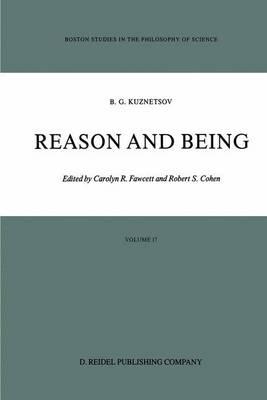Overview
Boris Kuznetsov was a scientist among humanists, a philosopher among scientists, a historian for those who look to the future, an optimist in an age of sadness. He was steeped in classical European culture, from earliest times to the latest avant-garde, and he roamed through the ages, an inveterate time-traveller, chatting and arguing with Aristotle and Descartes, Heine and Dante, among many others. Kuznetsov was also, in his intelligent and thoughtful way, a Marxist scholar and a practical engineer, a patriotic Russian Jew of the first sixty years of the Soviet Union. Above all he meditated upon the revolutionary developments of the natural sciences, throughout history to be sure but particularly in his own time, the time of what he called 'non-classical science', and of his beloved and noblest hero, Albert Einstein. Kuznetsov was born in Dnepropetrovsk on October 5, 1903 (then Yekaterinoslav). By early years he had begun to teach, first in 1921 at an institute of mining engineering and then at other technological institutions. By 1933 he had received a scientific post within the Academy of Science of the U. S. S. R. , and then at the end of the Second World War he joined several colleagues at the new Institute of the History of Science and Technology. For more than 40 years he worked there until his death two years ago.
Full Product Details
Author: Boris G. Kuznetsov ,
Carolyn R. Fawcett ,
Lynn Visson ,
Robert S. Cohen
Publisher: Springer
Imprint: Kluwer Academic Publishers
Edition: 1987 ed.
Volume: 17
Dimensions:
Width: 15.50cm
, Height: 3.00cm
, Length: 23.50cm
Weight: 1.890kg
ISBN: 9789027721815
ISBN 10: 9027721815
Pages: 444
Publication Date: 31 March 1987
Audience:
College/higher education
,
Professional and scholarly
,
Postgraduate, Research & Scholarly
,
Professional & Vocational
Format: Hardback
Publisher's Status: Active
Availability: In Print

This item will be ordered in for you from one of our suppliers. Upon receipt, we will promptly dispatch it out to you. For in store availability, please contact us.
Reviews
...the editors deserve warm thanks for making one of Kuznetsov's most important books available to readers of English in a form worthy of its substance.' ISIS, Vol. 79, No. 1, 1988
'...the editors deserve warm thanks for making one of Kuznetsov's most important books available to readers of English in a form worthy of its substance.' ISIS, Vol. 79, No. 1, 1988
'...the editors deserve warm thanks for making one of Kuznetsov's most important books available to readers of English in a form worthy of its substance.' ISIS, Vol. 79, No. 1, 1988
'...the editors deserve warm thanks for making one of Kuznetsov's most important books available to readers of English in a form worthy of its substance.' ISIS, Vol. 79, No. 1, 1988



